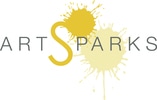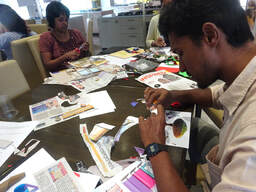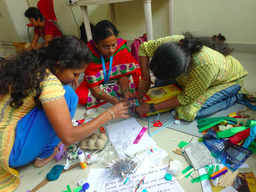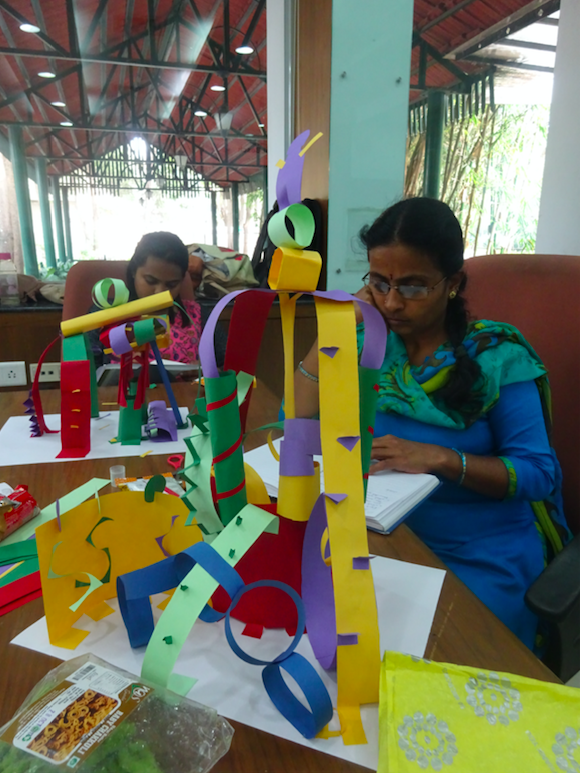EdSparks Collective
|
Visual arts learning is key not only to the development of students’ imagination, expression, and observational skills, but to their cognitive developmental as well. EdSparks Collective is a one-of-a-kind, 12-session professional development program for all those interested in exploring the full potential of the visual arts to transform student learning. It is supported by the Wipro Foundation.
Each workshop session is carefully designed to gradually build participants capacity to design and implement enriching educational interventions that use visual arts to foster 21st century learning and life skills in children. No prior experience in art or art education is needed to participate. Click here to learn more about 21st century learning and life skills. Tesitimonial Wondering how you could benefit from being a part of EdSparks Collective? Read about how past EdSparks Collective participants have applied their learnings in the field in this Art Education issue of Samuhik Pahal, guest edited by ArtSparks Foundation. Curious to know more about the real world impact? Click here for our impact studies with past EdSparks Collective members. |
|
EdSparks Collective Program in a Nutshell:
To know more about the program costs, get in touch with us at [email protected] or through the form below. EdSparks cohort members become part of a larger community of practice, and are provided with on-going support throughout the year, post the EdSparks Collective program. Support is offered to help participants design and implement robust art interventions in their respective organizations. |
ArtSparks Foundation has impacted the learning of over 15,000 children through EdSparks Collective. We are committed to sharing our methodology with a wider audience, and thereby impacting more children.
EdSparks participants include all those involved in the learning and development of children, namely:
Some of the many non-profit organizations that EdSparks participants come from, include:
EdSparks participants include all those involved in the learning and development of children, namely:
- Educators
- NGO Program Administrators
- Curriculum Developers/Resource Persons
- Teacher Development Professionals
- Change Agents
- Social Entrepreneurs
- Parents
- Visual Artists
- Working Professionals
- Volunteers
- Students (particularly those in the streams of Education, Development, Psychology, Social Work, Sociology, Art & Design)
Some of the many non-profit organizations that EdSparks participants come from, include:
- Adhvan Foundation
- Association of People with Disability (APD)
- AWMH Maharashtra
- Ayang Trust
- Bookworm Trust
- Chale Chalo
- Children's Movement for Civic Awareness (CMCA)
- Concerns Universe Foundation
- Fourth Wave Foundation
- Gubbachi Learning Community
- i-Saksham
- Kanavu
- Kshamtalaya Foundation
- Let's Educate Children in Need (LECIN)
- Let's Open a Book
- Maarga Karnataka
- Makkala Jagriti
- Mantra 4 Change
- Nature Conservation Foundation
- Parikrama Humanity Foundation
- Patang
- Shiksharth
- Simple Education Foundation
- SwaTaleem Foundation
- Swatantra Talim
- The Art of Play Foundation
- Thrive Foundation
- Unnati Institute
- V-Excel Education Trust
- Wipro Foundation
EdSparks Collective is supported by the Wipro Foundation
Testimonials
|
Fundamentally the classroom belongs to children and it is their voice, their expression that should reverberate in the air. Usually in my math and language class, no matter how hard I try to create a space for children where they can take the lead, the teacher in me still plays a substantial and loud role in the class. However, in the arts, the teacher could almost become redundant and children naturally take the lead. As a teacher it was really liberating to become a facilitator who had the least to do in the class. Coming to my understandings of the arts, my own experience with it was extremely limited, but my interest was massive. However, I was unaware of the explorative approach to art. As I explored the paint and paper myself during the EdSparks sessions, I realized its true power. The explorations helped me when I was making something. I was more confident in putting down my ideas because exploration prepared me for the battle. It was also overwhelming for me to understand how much breaking down of art-making into scaffolds could help enrich the process, giving the necessary pause between increasing complexity, allowing children to learn and reflect deeply. I have used scaffolds on a regular basis in my math and language class. Doing it in art was a fascinating act. Apart from all this, the technicality of the process of art-making and the methodology to facilitate meaningful sessions was something I had to equip myself with. For instance using the Socratic method of asking questions so students find out their own answers. For instance, when I asked why are we drawing very light lines initially and then darkening it later, some children could figure out the answer themselves. In totality, the belief that everyone can become an arts educator is germinating gradually in my heart.
—Neeraj, Shiksharth I had already been looking for an inclusive art-based intervention when I came to the EdSparks workshop. I imagined it would be possible to create an environment in which every child would learn and thrive, irrespective of their skill level. When I came to the workshop, I had a feeling that this is what I had been looking for. This belief was strengthened even more as we came to the first module. I was quite excited to see the outcomes of the ALP, even though I wasn’t quite sure what it’d be like. My biggest discovery was an inclusive intervention like this works a little bit like a library – everyone reads the same book or listens to the same story, but every child takes away something different from it. Every child during the ALP was working on a collage project, but I see could every one of them blossom differently and at the same time the group evolved as a whole. —Ruchi, Let's Open a Book I think the biggest change I see in my understanding of arts-based interventions is deep appreciation for robust processes and time. I feel like I really understand why we needed 7 sessions and why they needed to be at least an hour long. I am able to better appreciate the step by step process that the ALP emphasizes. Even though we experienced this during the first week of the course, I was apprehensive of how this would work in a school setting with students. I felt students may get bored or schools may not allow for this much time but after the ALP I definitely think this process is valuable and has so many takeaways for the children and the facilitator. I realized how important the demo sessions were for students. The check for understanding also revealed how and what students remembered and recalled. This allocation of dedicated time for arts-based education is important and it is essential to convince schools of the benefits, both explicit and implicit. A few sessions in, the class teacher of the group we worked with said, 'I can see they are learning manners, they are beginning to respect each other.' She saw her students begin to take turns, ask for materials instead of snatching it away—there is still a lot of work to be done but it was a beginning she was happy to notice. EdSparks’ celebration of Arts as a means to gain and hone 21st century learning and life skills is ingenious! I perhaps did not fully comprehend the potential of the arts until I went through the ALP. It was fascinating to watch how skills of close observation, creative risk-taking, and collaboration gradually developed in the group as they progressed through the sessions. Art education offers so much; each child has the opportunity to make their own meaning of the processes and explorations and find joys in little discoveries; from learning how cut circles to rolling paper to making a curly tail! —Roshni, Nature Conservation Foundation |
Content and images are the property of ArtSparks Foundation. Copyright © 2024. All Rights Reserved.




